

CHAPTER X
TURKEY'S ABROGATION OF THE CAPITULATIONS---ENVER LIVING IN A PALACE, WITH PLENTY OF MONEY AND AN IMPERIAL BRIDE
Another question, which had been under discussion for several months, now became involved in the Turkish international situation. That was the matter of the capitulations. These were the treaty rights which for centuries had regulated the position of foreigners in the Turkish Empire. Turkey had never been admitted to a complete equality with European nations, and in reality she had never been an independent sovereignty. The Sultan's laws and customs differed so radically from those of Europe and America that no non-Moslem country could think of submitting its citizens in Turkey to them. In many matters, therefore, the principle of ex-territoriality had always prevailed in favour of all citizens or subjects of countries enjoying capitulatory rights. Almost all European countries, as well as the United States, for centuries had had their own consular courts and prisons in which they tried and punished crimes which their nationals committed in Turkey. We all had our schools, which were subject, not to Turkish law and protection, but to that of the country which maintained them. Thus Robert College and the. Constantinople College for Women, those wonderful institutions which American philanthropy has erected on the Bosphorus, as well as hundreds of American religious, charitable, and educational institutions, practically stood on American territory and looked upon the American Embassy as their guardian. Several nations had their own post offices, as they did not care to submit their mail to the Ottoman postal service. Turkey likewise did not have unlimited power of taxation over foreigners. It could not even increase their customs taxes without the consent of the foreign powers. In 1914 it could impose only 11 per cent. in tariff dues, and was attempting to secure the right to increase the amount to 14. We have always regarded England as the only free-trade country, overlooking the fact that this limitation in Turkey's customs dues had practically made the Ottoman Empire an unwilling follower of Cobden. Turkey was thus prohibited by the Powers from developing any industries of her own; instead, she was forced to take large quantities of inferior articles from Europe. Against these restrictions Turkish statesmen had protested for years, declaring that they constituted an insult to their pride as a nation and also interfered with their progress. However, the agreement was a bi-lateral one, and Turkey could not change it without the consent of all the contracting powers. Yet certainly the present moment, when both the Entente and the Central Powers were cultivating Turkey, served to furnish a valuable opportunity to make the change. And so, as soon as the Germans had begun their march toward Paris, the air was filled with reports that Turkey intended to abrogate the capitulations. Rumour said that Germany had consented, as part of the consideration for Turkish aid in the war, and that England had agreed to the abrogation, as part of her payment for Turkish neutrality. Neither of these reports was true. What was manifest, however, was the panic which the mere suggestion of abrogation produced on the foreign population. The idea of becoming subject to the Turkish laws and perhaps being thrown into Turkish prisons made their flesh creep---and with good reason.
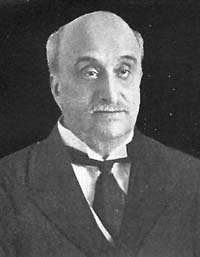 Fig. 16.
THE MARQUIS GARRONI, ITALIAN AMBASSADOR TO THE SUBLIME PORTE IN 1914
Fig. 16.
THE MARQUIS GARRONI, ITALIAN AMBASSADOR TO THE SUBLIME PORTE IN 1914
About this time I had a long conference with Enver. He asked me to call at his residence, as he was laid up with an infected toe, the result of a surgical operation. I thus had an illuminating glimpse of the Minister of War en famille. Certainly this humble man of the people had risen in the world. His house, which was in one of the quietest and most aristocratic parts of the city, was a splendid old building, very large and very elaborate. I was ushered through a series of four or five halls, and as I went by one door the Imperial Princess, Enver's wife, slightly opened it and peeked through at me. Farther on another Turkish lady opened her door and also obtained a fleeting glimpse of the Ambassadorial figure. I was finally escorted into a beautiful room in which Enver lay reclining on a semi-sofa. He had on a long silk dressing gown and his stockinged feet hung languidly over the edge of the divan. He looked much younger than in his uniform; he was an extremely neat and well-groomed object, with a pale, smooth face, made even more striking by his black hair, and with delicate white hands, and long, tapering fingers. He might easily have passed for under thirty, and, in fact, he was not much over that age. He had at hand a violin, and a piano near by also testified to his musical taste. The room was splendidly tapestried; perhaps its most conspicuous feature was a da s upon which stood a golden chair; this was the marriage throne of Enver's imperial wife. As I glanced around at all this luxury, I must admit that a few uncharitable thoughts came to mind and that I could not help pondering a question which was then being generally asked in Constantinople. Where did Enver get the money for this expensive establishment? He had no fortune of his own---his parents had been wretchedly poor, and his salary as a cabinet minister was only about $8,000. His wife had a moderate allowance as an imperial princess, but she had no private resources. Enver had never engaged in business, he had been a revolutionist, military leader, and politician all his life. But here he was living at a rate that demanded a very large income. In other ways Enver was giving evidences of great and sudden prosperity, and already I had heard much of his investments in real estate, which were the talk of the town.
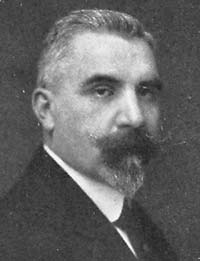 Enver wished to discuss the capitulations. He practically
said that the Cabinet had decided on the abrogation, and he wished to know
the attitude of the United States. He added that certainly a country which
had fought for its independence as we had would sympathize with Turkey's
attempt to shake off these shackles. We had helped Japan free herself from
similar burdens and wouldn't we now help Turkey? Certainly Turkey was as
civilized a nation as Japan?
Enver wished to discuss the capitulations. He practically
said that the Cabinet had decided on the abrogation, and he wished to know
the attitude of the United States. He added that certainly a country which
had fought for its independence as we had would sympathize with Turkey's
attempt to shake off these shackles. We had helped Japan free herself from
similar burdens and wouldn't we now help Turkey? Certainly Turkey was as
civilized a nation as Japan?
Fig. 17. M. TOCHEFF, BULGARIAN MINISTER AT CONSTANTINOPLE IN 1914
I answered that I thought that the United States might consent to abandon the capitulations in so far as they were economic. It was my opinion that Turkey should control her customs duties and be permitted to levy the same taxes on foreigners as on her own citizens. So long as the Turkish courts and Turkish prisons maintained their present standards, however, we could never agree to give up the judicial capitulations. Turkey should reform the abuses of her courts; then, after they had established European ideas in the administration of justice, the matter could be discussed. Enver replied that Turkey would be willing to have mixed tribunals and to have the United States designate some of the judges, but I suggested that, inasmuch as American judges did not know the Turkish language or Turkish law, his scheme involved great practical difficulties. I also told him that the American schools and colleges were very dear to Americans, and that we would never consent to subjecting them to Turkish jurisdiction.
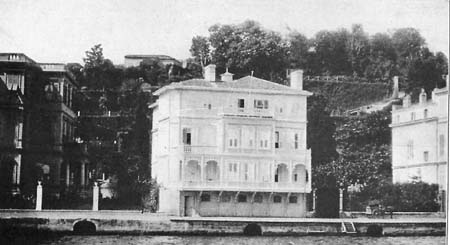
Fig. 18. THE AMERICAN
SUMMER EMBASSY ON THE BOSPHORUS. Not far away, across the Strait, which
is here only a mile wide, Darius crossed with his Asiatic hosts nearly 2,500
years ago
Despite the protests of all the ambassadors, the Cabinet issued its notification that the capitulations would be abrogated on October 1st. This abrogation was all a part of the Young Turks' plan to free themselves from foreign tutelage and to create a new country on the basis of "Turkey for the Turks." It represented, as I shall show, what was the central point of Turkish policy, not only in the empire's relations to foreign powers, but to her subject peoples. England's position on this question was about the same as our own; the British Government would consent to the modification of the economic restrictions, but not the others. Wangenheim, was greatly disturbed, and I think that his foreign office reprimanded him for letting the abrogation take place, because he blandly asked me to announce that I was the responsible person! As October 1st approached, the foreigners in Turkey were in a high state of apprehension. The Dardanelles had been closed, shutting them off from Europe, and now they felt that they were to be left to the mercy of Turkish courts and Turkish prisons. Inasmuch as it was the habit in Turkish prisons to herd the innocent with the guilty, and to place in the same room with murderers, people who had been charged, with minor offenses, but not convicted of them, and to bastinado recalcitrant witnesses, the fears of the foreign residents may well be imagined. The educational institutions were also apprehensive, and in their interest I now appealed to Enver. He assured me that the Turks had no hostile intention toward Americans. I replied that he should show in unmistakable fashion that Americans would not be harmed.
"All right," he answered. "What would you suggest?"
"Why not ostentatiously visit Robert College on October 1st, the day the capitulations are abrogated?" I said.
The idea was rather a unique one, for in all the history of this institution an important Turkish official had never entered its doors. But I knew enough of the Turkish character to understand that an open, ceremonious visit by Enver would cause a public sensation. News of it would reach the farthest limits of the Turkish Empire, and it was certain that the Turks would interpret it as meaning that one of the two most powerful men in Turkey had taken this and other American institutions under his patronage. Such a visit would exercise a greater protective influence over American colleges and schools in Turkey than an army corps. I was therefore greatly pleased when Enver promptly adopted my suggestion.
On the day that the capitulations were abrogated, Enver appeared at the American Embassy with two autos, one for himself and me, and the other for his adjutants, all of whom were dressed in full uniform I was pleased that Enver had made the proceeding so spectacular, for I wished it to have the widest publicity. On the ride up to the college I told Enver all about these American institutions and what they were doing for Turkey. He really knew very little about them, and, like most Turks, he half suspected that they concealed a political purpose.
"We Americans are not looking for material advantages in Turkey," I said. "We merely demand that you treat kindly our children, these colleges, for which all the people in the United States have the warmest affection."
I told him that Mr. Cleveland H. Dodge, President of the trustees of Robert College, and Mr. Charles R. Crane, President of the trustees of the Women's College, were intimate friends of President Wilson. "These," I added, "represent what is best in America and the fine altruistic spirit which in our country accumulates wealth and then uses it to found colleges and schools. In establishing these institutions in Turkey they are trying, not to convert your people to Christianity, but to help train them in the sciences and arts and so prepare to make them better citizens. Americans feel that the Bible lands have given them their religion and they wish to repay with the best thing America has ---its education." I then told him about Mrs. Russell Sage and Miss Helen Gould, who had made large gifts to the Women's College.
"But where do these people get all the money for such benefactions?" Enver asked.
I then entertained him for an hour or so with a few pages from our own "American Nights." I told him how Jay Gould had arrived in New York, a penniless and ragged boy, with a mousetrap which he had invented, "and how he had died, almost thirty years afterward, leaving a fortune of about $100,000,000. I told him how Commodore Vanderbilt had started life as a ferryman and had become America's greatest railroad "magnate"; how Rockefeller had begun his career sitting on a high stool in a Cleveland commission house, earning six dollars a week, and had created the greatest fortune that had ever been accumulated by a single man in the world's history. I told him how the Dodges had become our great "copper kings" and the Cranes our great manufacturers of iron pipe. Enver found these stories more thrilling than any that had ever come out of Bagdad, and I found afterward that he had retold them so frequently that they had reached almost all the important people in Constantinople.
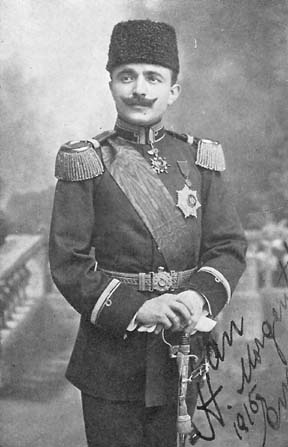 Enver was immensely impressed also by what I said about
the American institutions. He went through all the buildings and expressed
his enthusiasm at everything he saw, and he even suggested that he would
like to send his brother there. He took tea with Mrs. Gates, wife of President
Gates, discussed most intelligently the courses, and asked if we could not
introduce the study of agriculture. The teachers he met seemed to be a great
revelation.
Enver was immensely impressed also by what I said about
the American institutions. He went through all the buildings and expressed
his enthusiasm at everything he saw, and he even suggested that he would
like to send his brother there. He took tea with Mrs. Gates, wife of President
Gates, discussed most intelligently the courses, and asked if we could not
introduce the study of agriculture. The teachers he met seemed to be a great
revelation.
Fig. 19. ENVER PASHA, MINISTER OF WAR. A man of the people, who, at 26, was a leader in the revolution which deposed Abdul Hamid and established the new régime of the Young Turks. At that time the Young Turks honestly desired to establish a Turkish democracy. This attempt failed miserably and the Young Turk leaders then ruled the Turkish Empire for their own selfish purposes, and developed a government which is much more wicked and murderous than that of Abdul Hamid. Enver is the man chiefly responsible for turning the Turkish army over to Germany. He imagines himself a Turkish combination of Napoleon and Frederick the Great
"I expected to find these missionaries as they are pictured in the Berlin newspapers," he said, "with long hair and hanging jaws, and hands clasped constantly in a prayerful attitude. But here is Dr. Gates, talking Turkish like a native and acting like a man of the world. I am more than pleased, and thank you for bringing me."
We all saw Enver that afternoon in his most delightful aspect. My idea that this visit in itself would protect the colleges from disturbance proved to have been a happy one. The Turkish Empire has been a tumultuous place in the last four years, but the American colleges have had no difficulties, either with the Turkish Government or with the Turkish populace.
This visit was only an agreeable interlude in events of the most exciting character. Enver, amiable as he could be on occasion, had deliberately determined to put Turkey in the war on Germany's side. Germany had now reached the point where she no longer concealed her intentions. Once before, when I had interfered in the interest of peace, Wangenheim had encouraged my action. The reason, as I have indicated, was that, at that time, Germany had wished Turkey to keep out of the war, for the German General Staff expected to win without her help. But now Wangenheim wanted Turkey in. As I was not working in Germany's interest, but as I was anxious to protect American institutions, I still kept urging Enver and Talaat to keep out. This made Wangenheim. angry. "I thought that you were a neutral?" he now exclaimed.
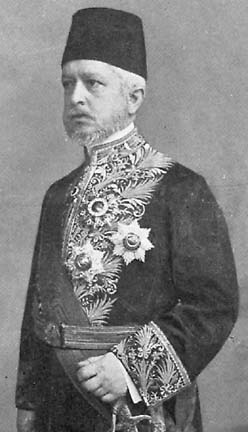 "I thought that you were---in Turkey," I answered.
"I thought that you were---in Turkey," I answered.
Toward the end of October, Wangenheim. was leaving nothing undone to start hostilities; all he needed now was a favourable occasion.
Fig. 20. SAID HALIM EX-GRAND VIZIER Saïd is an Egyptian prince, who provided campaign money for the political activities of the Young Turks, and, as a reward, was made Grand Vizier. In this position he was not permitted to exercise any real authority. He was promised that when the Young Turks succeeded in expelling England from Egypt, he should become Khedive
Even after Germany had closed the Dardanelles, the German Ambassador's task was not an easy one. Talaat was not yet entirely convinced that his best policy was war, and, as I have already said, there was still plenty of pro-Ally sympathy in official quarters. It was Talaat's plan not to seize all the cabinet offices at once, but gradually to elbow his way into undisputed control. At this crisis the most popularly respected members of the Ministry were Djavid, Minister of Finance, a man who was Jewish by race, but a Mohammedan by religion; Mahmoud Pasha, Minister of Public Works, a Circassian; Bustány Effendi, Minister of Commerce and Agriculture, a Christian Arab; and Oskan Effendi, Minister of Posts and Telegraphs, an Armenian---and a Christian, of course. All these leaders, as well as the Grand Vizier, openly opposed war and all now informed Talaat and Enver that they would resign if Germany succeeded in her intrigues. Thus the atmosphere was exciting; how tense the situation was a single episode will show. Sir Louis Mallet, the British Ambassador, had accepted an invitation to dine at the American Embassy on October 20th, but he sent word at the last moment that he was ill and could not come. I called on the Ambassador an hour or two afterward and found him in his garden, apparently in the best of health. Sir Louis smiled and said that his illness had been purely political. He had received a letter telling him that he was to be assassinated that evening, this letter informing him of the precise spot where the tragedy was to take place, and the time. He therefore thought that he had better stay indoors. As I had no doubt that some such crime had been planned, I offered Sir Louis the protection of our Embassy. I gave him the key to the back gate of the garden; and, with Lord Wellesley, one of his secretaries---a descendant of the Duke of Wellington---I made all arrangements for his escape to our quarters in case a flight became necessary. Our two embassies were so located that, in the event of an attack, he might go unobserved from the back gate of his to the back gate of ours. "These people are relapsing into the Middle Ages," said Sir Louis, "when it was quite the thing to throw ambassadors into dungeons,", and I think that he anticipated that the present Turks might treat him in the same way. I at once went to the Grand Vizier and informed him of the situation, insisting that nothing less than a visit from Talaat to Sir Louis, assuring him of his safety, would undo the harm already done. I could make this demand with propriety, as we had already made arrangements to take over British interests when the break came. Within two hours Talaat made such a visit. Though one of the Turkish newspapers was printing scurrilous attacks on Sir Louis he was personally very popular with the Turks, and the Grand Vizier expressed his amazement and regret---and he was entirely sincere--- that such threats had been made.
Chapter Eleven: Germany forces Turkey into the war